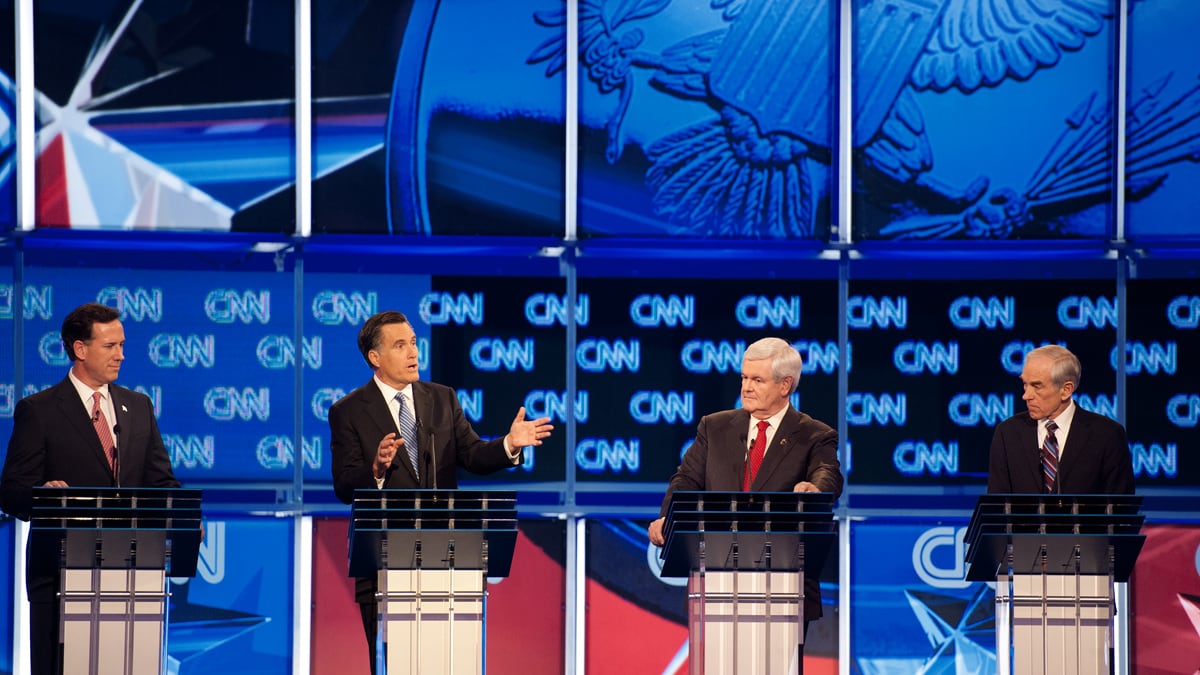Late-night comedians may lament the absence of Rick Perry—no more magical “oops!” moments; no more identifying the prime minister of our NATO ally Turkey as an “Islamic terrorist”—but Republican partisans ought to feel gratified by the latest and best of the GOP presidential debates.
The disappearance of distracting if colorful contenders with no real chance of victory allowed the occasion to achieve an unexpected aura of substance and seriousness. On this night of cold clarity in Charleston, S.C., New Mexican Gary Johnson, with his big dogs creating shovel-ready projects; Herman Cain, with his hypnotic 9-9-9 incantations; Michele Bachmann, with her piercing X-ray eyes and earnest intensity; Tim Pawlenty and his Mr. Rogers delivery; supercilious Jon Huntsman; and Ramblin’ Rick Perry all became irrelevant shades of a best-forgotten exhibition season full of whiffs and errors. With four contenders now occupying the big stage, the audience in Charleston and across the country could focus more fiercely on destiny and decision.
Remember all the derisive comments about previous encounters? Recall those with sneering suggestions that “The circus has come to town!” or “the GOP field is the political equivalent of the cantina scene in Star Wars?

This time, long-suffering conservatives endured nothing embarrassing or bizarre, insipid, or outlandish. The grinding primary process has effectively culled the herd, yielding four smart, articulate, middle-aged white-guy survivors—though describing the 76-year-old Ron Paul and the 68-year-old Newt Gingrich as middle-aged might stretch the traditional definition.
All four of the remaining candidates could credibly assume command in the Oval Office. Three of the four looked and sounded presidential. Two of the four could conceivably win the GOP nomination, and one of them might even defeat Barack Obama.
The most dramatically improved candidate was Rep. Ron Paul, who came through with by far the finest media performance of his career. For the first time in three presidential runs, he seemed to enjoy himself in one of these candidate forums, treating the event like an opportunity rather than an ordeal. His slower delivery, which he explicitly acknowledged toward the end of the evening, allowed his customary ranting to give way to relaxed affability. Though still crotchety and full of quirks, he came across more like a wise, lovable grandpa than the insane uncle only occasionally allowed to leave the attic.
On every issue, Dr. Paul provided persuasive, thoughtful arguments, with winning references to his years as a medical practitioner. Fortunately for him, no questions focused on foreign policy or even touched on the explosive problem of Iran, and the only references to America’s place in the world came in the congressman’s uncontroversial and sympathetic pleas to save money on overseas engagements to focus more attention on problems at home. If Paul keeps it up, he’ll make me regret designating him “Dr. Demento” on my radio show.
Both Mitt Romney and Newt Gingrich, the two acknowledged frontrunners, looked formidable, and conservatives must relish the prospect of either man besting Obama in televised debate.
Gingrich sagely decided to dial back the bombast, and a less raucous crowd than Monday night’s blood-lusting bunch at Myrtle Beach helped with the process. When CNN’s John King decided to launch the evening with a clumsy “have you stopped beating your wife” question about creepy, intimate charges from Newt’s second ex, the former speaker reacted with righteous and altogether appropriate indignation, helping himself immeasurably in handling an appallingly personal issue. The other three instantly agreed to change the subject, with Romney’s simple but forceful one-sentence call to “talk about the real issues” coming across as especially effective. On small items of debate projection, Newt also raised his game, listening more respectfully to his rivals and generally projecting determination and ambition more than pomposity.
Romney also picked up the pace and passion of his responses, erasing most memories of his uncomfortable moments of Monday night. The defense of his work with Bain Capital finally sounded airtight and unapologetic, making it a defense of the free market itself and adding just a hint of welcome anger and exasperation.
He still needs a simple, comprehensible explanation of his delay in releasing his tax information, and if he wins in South Carolina—hardly a sure thing, but still eminently possible—he should dump the papers on the public in the immediate wake of his victory. That way it becomes a winner’s magnanimous gesture, not a desperate ploy by a struggling candidate. The notion of delaying the inevitable release till April makes no sense and damages his candidacy during each day of needless hesitation. After halting and uncertain moments three days ago, the Mittster still seemed to get his mojo back and cemented his status in the minds of most Republicans, according to pollsters, as the candidate best positioned to upset Obama.
The only big loser in Charleston was Rick Santorum, who somehow embraced the idiotic idea that he could boost his own failing popularity by attacking all three rivals on the stage with him. Why the tedious tendency to pick fights with worthy colleagues over issues of scant significance, like his meaningless rope-a-dope session with Romney on Monday night over granting voting rights to released felons?
This time, Santorum’s smug, sanctimonious squabbling contrasted with the obvious determination of the other three to demonstrate mutual respect, collegiality, and a shared commitment to defeating Obama.
Romney gave the best answer when asked a provocative question by John King about what he wished he had done differently in the campaign. After quipping that he wished he had campaigned a bit harder and gotten a few dozen more votes in Iowa, he rather plaintively suggested that he should have spent less time attacking other Republicans on the stage with him and concentrated more fire on Obama.
In this spirit, Romney, Gingrich, and Paul tried to articulate big issues and soaring plans for structural change, while the Pennsylvania Purist kept scab-picking on his smug claim that they didn’t truly count as “conviction conservatives” and that he alone boasted an unsullied record.
This approach reflects a dangerous misreading of the public mood. America doesn’t yearn for Mr. True Conservative; the nation instead wants Mr. Fix-It, a capable, pragmatic guy who can reassemble or eliminate broken systems, stop wasteful spending, clean house, and get the government running with more acceptable efficiency. Obama himself shows the dolorous dangers of unalloyed ideology, making transformation a higher priority than repair. With the eloquence and energy on display at Charleston, the GOP may get the chance of offer a plausible and practical alternative.






